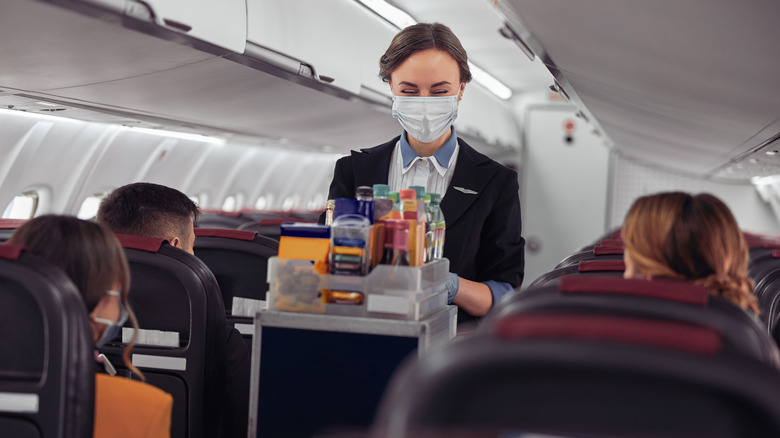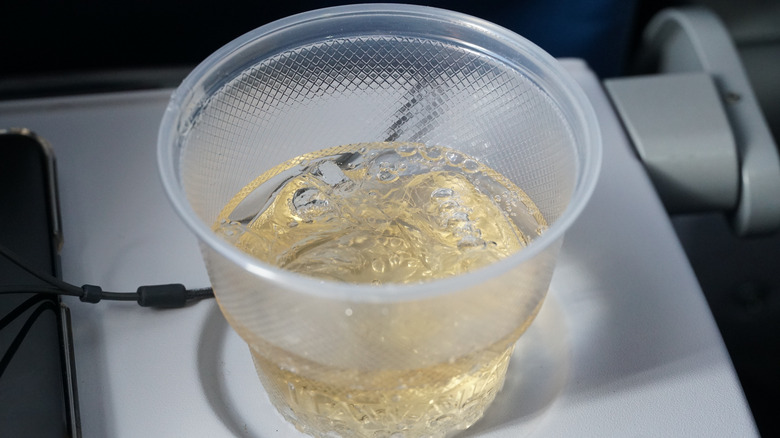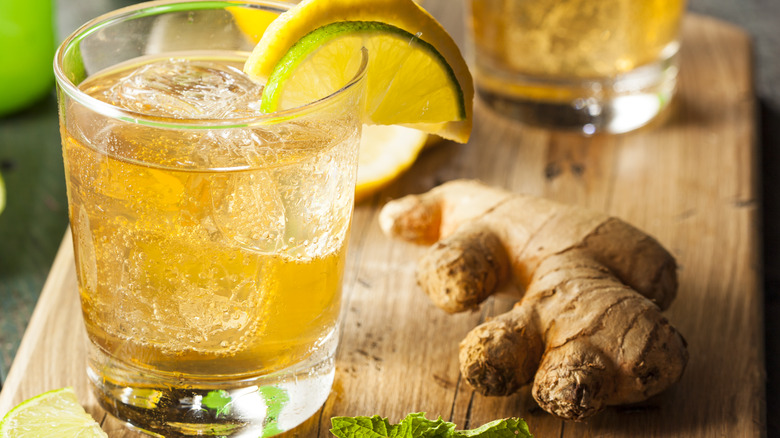Here's Why You're Always Craving This Tasty, Fizzy Beverage Mid-Flight
It's no secret that ginger ale is a beloved beverage among fliers. With its subtle ginger flavor and invigorating sweetness, this bubbly drink is a classic for a reason. However, many people specifically ask for this soda on a flight, whereas they may not crave it in everyday life. In a TikTok video, one user wrote, "I don't normally drink soda, but ginger ale is magical sky juice." Now, what makes airplane ginger ale so special?
While you should think again before ordering other common beverages on a flight, ginger ale has several upsides as an occasional airplane treat (just say no to ice in your drink). Yet, you might be surprised to learn why it hits the spot when flying. Spoiler alert: it's not because it cures queasiness. Instead, consider your seat position if you're worried about getting motion sickness. Aside from its association with nausea relief, there's another ginger ale mystery related to your sense of taste that we're here to unravel. Science may play a role in your in-flight ginger ale cravings, as your sense of taste actually shifts on an airplane.
Why perception of sweetness changes on an airplane
Regarding why food tastes different in-flight, Oxford University professor of experimental psychology Charles Spence told BBC, "There are several reasons for this: lack of humidity, lower air pressure, and the background noise." In 2011, Germany's Fraunhofer Institute for Building Physics published research findings examining how flying affects taste receptors. As it turns out, being in the air alters the perception of sweetness, with sugar tasting 15 to 20% less potent.
To give you perspective, a 355 mL Canada Dry Ginger Ale can contains 32 grams of sugar. The American Heart Association recommends limiting added sugar intake to 25 to 36 grams per day. Commercial ginger ale may be too saccharine for some people, but flying can significantly change one's experience. The soda could taste much more crisp and dry than on the ground. While ginger ale's sugar content isn't any lower on a flight, it can very well seem like it is!
Ginger ale may be a powerful placebo
It's a common belief that ginger ale eases stomach ailments, leading some to order the soft drink in hopes of curing their in-flight nausea. While this assumption isn't entirely accurate, it's not far-fetched either. Per Food Science & Nutrition, data analysis of clinical trials showed that a 1,500-milligram daily dosage of ginger (divided into lower doses) could alleviate nausea. However, there isn't evidence that commercial ginger ale offers such health benefits.
Canada Dry, in particular, has faced numerous lawsuits over false advertising. For example, one consumer claimed that he was misled by the company's "Natural" and "Made from Real Ginger" labels (via CTV News). The man's lawyer said, "They do buy actual ginger, but then what they do is they boil it in ethanol, and that essentially destroys any nutritional or medicinal benefits." They added that the process forms a ginger concentrate, with minuscule amounts dispensed across cans.
With its high sugar content, commercial ginger ale can also exacerbate stomach issues. That said, a long-held belief about the soda's healing powers could serve as a helpful placebo. M.D. Sherry Ross told Woman's Day, "You're buying into the power of suggestion. We've learned from our mothers and grandmothers, who brought us ginger ale and chicken-noodle soup when we were sick as kids, that ginger ale works." So, sipping ginger ale may provide nostalgic comfort during a turbulent flight.


